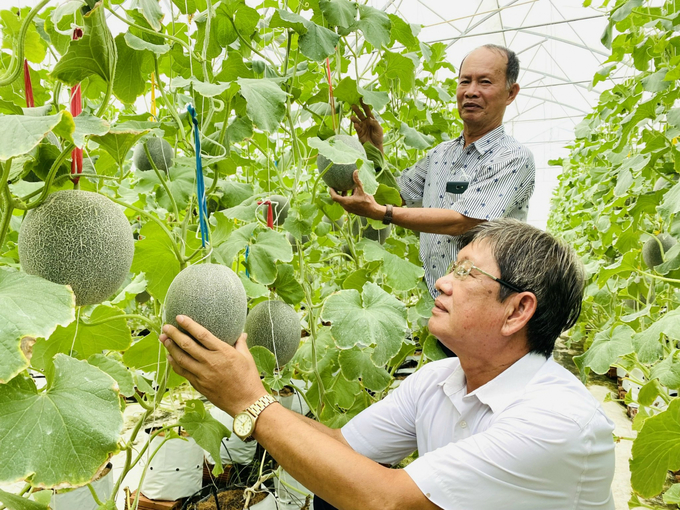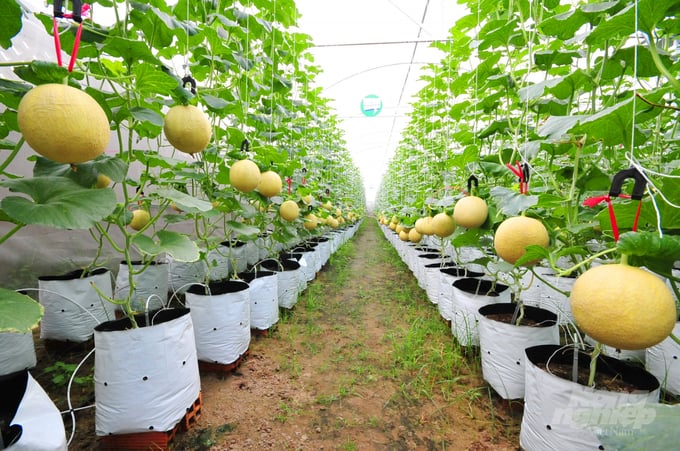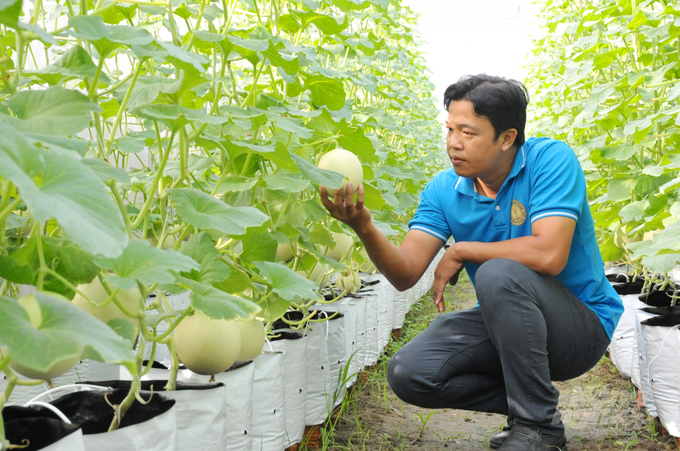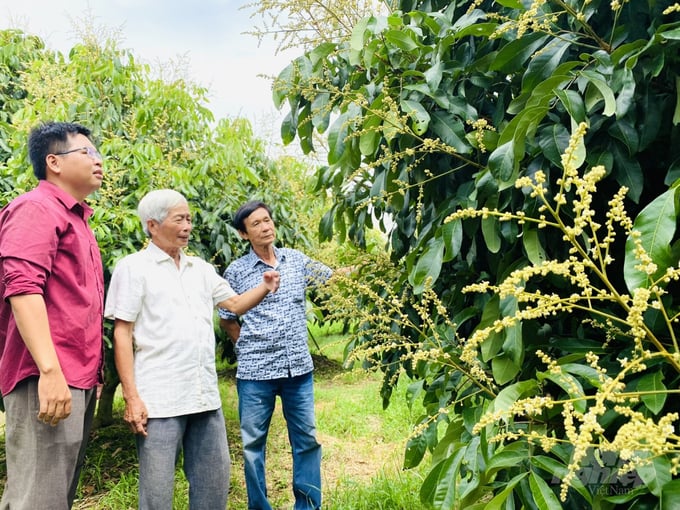June 18, 2025 | 17:03 GMT +7
June 18, 2025 | 17:03 GMT +7
Hotline: 0913.378.918
June 18, 2025 | 17:03 GMT +7
Hotline: 0913.378.918

Farmers in Can Tho City boldly switched from traditional agriculture to organic agriculture, which is yielding positive results. Photo: Le Hoang Vu.
Mr. Tran Thai Nghiem, Deputy Director of Can Tho City Department of Agriculture and Rural Development said that the city is accelerating the implementation of the project on restructuring the agricultural sector towards enhancing added value and sustainable development. The city has surveyed and oriented organic production planning for approximately 4,000 hectares of rice, 1,300 hectares of fruit trees and 150 hectares of vegetables as well as organic aquaculture located in rice fields and orchards.
Can Tho city's agricultural sector is currently focusing on developing circular agriculture in association with planning and developing organic agriculture. The city has planned a number of organic production areas on rice, vegetables and fruit trees. It is expected that in 2025, from 2 to 2.5% of the agricultural production area of Can Tho will be certified as organic, and that figure is expected to rise to 4 to 5% in 2030.
Mr. Nghiem added that in order to reach this target, the city will develop policies to encourage farmers to invest and apply production towards organic agriculture in the immediate future. The city also plans to conduct surveys to build organic production areas, synchronously implement policies in the spirit of Decree No. 109 on organic agriculture development.
In addition, Can Tho aims to develop policies for synchronous development of agriculture and rural areas and integrate agricultural extension, new rural construction programs along other programs to promote agricultural development. Moreover, Can Tho's agricultural sector also regularly promote and facilitate linkages between businesses and farmers as well as cooperatives in the area to strengthen the organization of organic production projects.

It is expected that in 2025, from 2 to 2.5% of the agricultural production area of Can Tho will be certified as organic, and that figure is expected to rise to 4 to 5% in 2030. Photo: Le Hoang Vu.
“For the modern agricultural sector, agricultural production development and more specifically, organic agricultural production requires that farmers connect with businesses to supplement and create favorable conditions for farmers, share risks, costs as well as profits. Can Tho expects that with the current development planning, the first quality organic products in the Mekong Delta will emerge from 2021 to 2025", emphasized Mr. Nghiem.
Mr. Nguyen Minh Tri, Director of Dafa Viet Organic Fertilizer Company reported that the company has coordinated with farmers to develop organic agricultural models through the construction of pilot models on rice in various provinces and cities in the Mekong Delta with a scale of 400 to 600 hectares. Additionally, the company has also deployed several pilot models on fruit trees and vegetables.
As a result, the pilot models have contributed to changing the perception of farmers regarding the effectiveness of converting from inorganic to organic fertilizers; product quality and environment have subseqently improved over time. In the near future, the company will introduce policies to replicate this pilot model for farmers to apply on a larger scale.

Can Tho expects the first quality organic agricultural products in the Mekong Delta from 2021 to 2025. Photo: Le Hoang Vu.
In order to develop sustainable organic agriculture while ensuring productivity and product quality, Can Tho city's agricultural sector needs to implement synchronously strengthening and supporting solutions.
Dr. Vu Duc Khang, Deputy Director of the Asian Organic Agricultural Research and Development Institute, said that it is necessary to implement as well as guide organic production. However, organic production is currently not well known, and it is not proportionately effective for organic producers. In the near future, the trend of organic agriculture will still be indispensible, so that the environment and ecosystem are safer and Vietnam's agriculture is sustainable and integrated globally.
Regarding the solution to implement organic agriculture, Dr. Khang strongly advised producers to utilize tools in organic farming including: use pest resistant varieties, use only organic fertilizers, avoid relying on chemicals, and enhance the resistance of plants. Futhermore, Dr. Khang suggested producers to use a thin layer of soil (approximately 10 to 15cm) to fertilize and facilitate the growth of microorganisms. He also recommends producers to apply crop rotation along with weed management.

A farm of organically-produced Ido longan in Dong Tam Agricultural Cooperative, Dinh Mon commune, Thoi Lai district, Can Tho city. Photo: Le Hoang Vu.
In addition to organic farming techniques, there should be specific policies to support production scale, and large-scale regional planning. The tools help farmers to produce fertilizers independently to re-produce and reduce input pressure for farmers. On the other hand, the pilot models help farmers understand sustainable organic agriculture to achieve productivity and quality as well as attract more people to organic production.
The agricultural sector in Can Tho city has been collaborating with different businesses to deploy organic production models on rice and fruit trees. However, organic agricultural production is only in its infancy in the development process, with a small scale and scope due to difficulties such as intensive farming practices that over-utilize chemical fertilizers, unstable selling prices, climate change, etc.
On the other hand, the requirement for arable land and irrigation water unpolluted by synthetic chemicals from industry, agriculture and daily life is also one of the obstacles that limits the expansion of organic production area.
Translated by Nguyen Hai Long
![Turning wind and rain into action: [9] Digitizing hydrometeorological data in response to climate change](https://t.ex-cdn.com/nongnghiepmoitruong.vn/608w/files/news/2025/06/17/z6704423696987_15fd32ffc26d590d204d520c9dac6786-nongnghiep-165943.jpg)
(VAN) Farmers have begun accessing hydrometeorological applications to adjust their cropping schedules, aiming to ensure productivity and adapt to climate change.
![Turning wind and rain into action: [8] Real-time salinity detection and early warning technology](https://t.ex-cdn.com/nongnghiepmoitruong.vn/608w/files/news/2025/06/17/z6704423696987_15fd32ffc26d590d204d520c9dac6786-nongnghiep-151127.jpg)
(VAN) Thanks to the integration of modern hydrological-hydraulic models, remote sensing technologies, and artificial intelligence, the accuracy of hydrological forecasting has significantly improved.
![Turning wind and rain into action: [7] Early disaster warnings help marine farmers minimize losses](https://t.ex-cdn.com/nongnghiepmoitruong.vn/608w/files/news/2025/06/17/z6704423696987_15fd32ffc26d590d204d520c9dac6786-nongnghiep-142942.jpg)
(VAN) In recent years, thanks to early disaster warnings and forecasting, marine farmers in Khanh Hoa province have been able to reduce risks and losses, thereby improving production efficiency.
![Turning wind and rain into action: [6] ‘Four on-the-spot’ disaster management software](https://t.ex-cdn.com/nongnghiepmoitruong.vn/608w/files/news/2025/06/17/e5a48259d6a262fc3bb3-nongnghiep-183800.jpg)
(VAN) By simply activating the scenario on the disaster management software, the relevant authorities immediately know how many households need to be evacuated, where to evacuate them to, and by what means of transportation…
![Turning wind and rain into action: [5] Hue applies modern technology in disaster forecasting](https://t.ex-cdn.com/nongnghiepmoitruong.vn/608w/files/news/2025/06/17/z6704423696987_15fd32ffc26d590d204d520c9dac6786-nongnghiep-093938.jpg)
(VAN) In Hue city, modern technology has recently been applied in meteorological and hydrological forecasting and warning, helping to reduce the damage caused by natural disasters.

(VAN) A cutting-edge farming technique being implemented on an experimental ranch in Arizona's Sonoran Desert has already saved a billion gallons of water over five years, according to Civil Eats.

(VAN) Poultry and pig production and the environment can be boosted through enhanced water technology, according to new research.